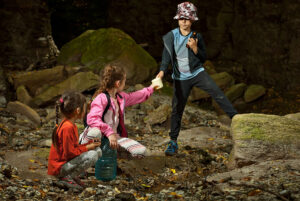When you welcome a group of siblings into your home after they have been removed from their birth family, one frequently takes on the role of substitute parent. The oldest child, typically the eldest girl, feels responsible for her younger siblings’ well-being. In this role, she might have also functioned as emotional and physical support for a parent. In essence, the child became the parent.
This is called parentification and commonly occurs when a sibling group has experienced trauma like neglect, loss, or chaos together.
Parentification is Often a Matter of Safety and Survival
 No child should have to become the parent to their siblings and parents. However, this might be how their little family group survived. Parentification is considered harmful because every child needs to be free to be just a child. Changing the dynamic for the parentified child can be tricky because it is familiar and safe for that child. They grew accustomed to being in charge and liked that they could be in control and keep everyone safe.
No child should have to become the parent to their siblings and parents. However, this might be how their little family group survived. Parentification is considered harmful because every child needs to be free to be just a child. Changing the dynamic for the parentified child can be tricky because it is familiar and safe for that child. They grew accustomed to being in charge and liked that they could be in control and keep everyone safe.
It will help you to remember that your grandchild needed that sense of control over their chaotic experiences. Over time, your grandchild likely developed a strong sense of identity in being responsible. Moving them out of this parent or caregiver role can threaten your grandchild’s emotional well-being and sense of self.
Changing a Parentified Child’s Role Takes Time and Patience
As this child’s primary caregiver and an experienced adult, you can recognize that all kids should have the right to be kids. You understand that a childhood experience is necessary to develop into adulthood in age-appropriate timelines. Therefore, it would be completely understandable, when welcoming a sibling group of grandkids or other loved ones, that you would work to be sure all the children are allowed to “just be kids.” Of course, you want them to have a normal childhood now that they are with you!
However, it would be best to consider the need to move slowly and gradually to change your grandchild’s ideas about their role in their siblings’ lives. Remember, it took years for this child to become a parent figure to their siblings. With patience and consistency, you can give them back their childhood.
Practical Tips to Help a Parentified Child Be a Child Again
- It’s natural to want your grandchild to have a normal childhood now that they are with you. But try not to force the timeline. Don’t change things too quickly. Focus on slowly building trust before altering roles.
- In the early days and weeks, set clear boundaries and define your family’s roles for adults (grandparents, aunts, uncles, primary caregivers) and children. Narrate the things that grownups do and clarify what things kids can do.
- Talk with your grandchild, who has been acting as the siblings’ caretaker. Ask what it was like to care for their siblings. Acknowledge and empathize that it feels weird and uncomfortable not being in charge.
- If the siblings are not living with you, find ways to keep them in contact with each other to help alleviate your grandchild’s worries. Acknowledge their guilt or helplessness over not being able to care for them.
- Expect this to be a gradual transition from parent to child/sibling role for your grandchild. It took a while to create this identity. It will take time to correct.
- If the siblings are living with you, ask the parentified grandchild to show you how to care for their siblings. Asking for their experience will help them feel valued and respected for their knowledge. For example, “What type of peanut butter does your little brother like?” “What soothes the baby when she is falling asleep?”
- Allow them to continue to carry out small responsibilities, such as giving baths, brushing hair, or getting snacks for their siblings. Talk about what a kind, loving big sister/brother they are for helping.
- Parentified children are often competent at many things. Find age-appropriate ways for them to use these skills outside of parenting their siblings. Consider volunteering at an animal shelter or being a guest reader at the library’s story time. Let them hear you bragging about them about it to someone else.
- Get your grandchild involved in activities with other children their age – school clubs, sports, church youth groups, tribal community events, art classes, etc.
- Find and continue therapy for the children for whom you are caring. Consider counseling as a tool to help all the kids understand the changes they are experiencing.
- Be patient, supportive, and understanding. Like other children in care, a parentified child behaves in ways that feel normal to them to help them survive and manage their fears. Trusting and feeling safe enough to let go of those roles will take time.
